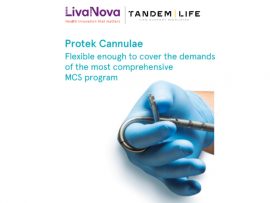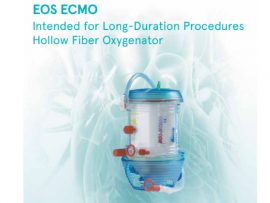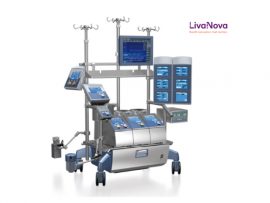Abstract Background Reliable predictors of outcomes in venoarterial extracorporeal membrane oxygenation (VA-ECMO) therapy are limited. While elevated lactate levels over time have been linked to outcomes in cardiogenic shock (CS),..
Read MoreAbstract BACKGROUND The effects of temporary mechanical circulatory support with a microaxial flow pump on mortality among patients with ST-segment elevation myocardial infarction (STEMI) complicated by cardiogenic shock remains unclear...
Read MoreAbstract Purpose: Venoarterial extracorporeal membrane oxygenation (V-A ECMO) can be used to support severely ill patients with cardiogenic shock. While age is commonly used in patient selection, little is known..
Read MoreAbstract Cardiogenic shock (CS) is a critical clinical syndrome characterized by inadequate tissue perfusion and oxygen delivery resulting from severe heart dysfunction, leading to multi-organ failure. Diagnostic criteria include hypoperfusion..
Read MoreAbstract Background The present article describes three cases of patients in cardiogenic shock (CS) with previous cardiac surgery that made them initially inoperable. Perioperative support with veno-arterial extracorporeal membrane oxygenation..
Read MoreAbstract Purpose: The outcomes of immunocompromised patients with cardiogenic shock treated with venoarterial extra‑corporeal membrane oxygenation (VA‑ECMO) are seldom documented, making ECMO candidacy decisions challeng‑ing. This study aims (1) to..
Read MoreAbstract Background This study examines the role of extracorporeal life support flow in the development of acute kidney injury in cardiogenic shock. Methods We performed a retrospective analysis of 465..
Read MoreAbstract Cardiogenic shock (CS) is a complex and life‐threatening condition characterized by a sudden and profound reduction in cardiac output, leading to inadequate tissue perfusion and oxygen delivery and organ..
Read MoreAbstract Background Venoarterial extracorporeal membrane oxygenation (ECMO) provides full hemodynamic support for patients with cardiogenic shock, but optimal timing of ECMO initiation remains uncertain. We sought to determine whether earlier..
Read MoreAbstract Peripheral venoarterial extracorporeal membrane oxygenation (VA-ECMO) is increasingly being used in patients suffering from refractory cardiogenic shock (CS). Although considered life-saving, peripheral VA-ECMO may also be responsible for intracardiac..
Read MoreAbstract Purpose: Cardiogenic shock is associated with high mortality. In refractory shock, it is unclear if mechanical circulatory support (MCS) devices improve survival. We conducted a network meta-analysis to determine..
Read MoreAbstract Background The present article describes three cases of patients in cardiogenic shock (CS) with previous cardiac surgery that made them initially inoperable. Perioperative support with veno-arterial extracorporeal membrane oxygenation..
Read MoreAbstract Cardiogenic shock is a complex and diverse pathological condition characterized by reduced myocardial contractility. The goal of treatment of cardiogenic shock is to improve abnormal hemodynamics and maintain adequate..
Read MoreAbstract Background Veno-arterial Extracorporeal Membrane Oxygenation (VA-ECMO) is a rescue treatment in refractory cardiogenic shock (CS) or refractory cardiac arrest (CA). Exposure to hyperoxemia is common during VA-ECMO, and its..
Read MoreAbstract OBJECTIVES: This review aims to: 1) identify the key circuit and patient factors affecting systemic oxygenation, 2) summarize the literature reporting the association between hyperoxia and patient outcomes, and..
Read MoreAbstract The development of mechanical circulatory support (MCS) has been rapid, and its use worldwide in patients with cardiogenic shock is increasingly widespread. However, current statistical data and clinical research..
Read MoreAbstract Background: Cardiogenic shock is associated with high mortality. In refractory shock, it is unclear if mechanical circulatory support (MCS) devices improve survival. We conducted a systematic review and network meta-analysis..
Read MoreAbstract Background: Although extracorporeal membrane oxygenation (ECMO) is an integral part of a robust cardiogenic shock program, it is associated with high mortality. The optimal strategy for weaning from ECMO is..
Read MoreAbstract Beside the tremendous developments in cardiac surgical procedures, the use of cardiopulmonary bypass (CPB) remains the gold standard to perform cardiac surgery but is associated with detrimental effects (e.g...
Read MoreAbstract Complexity and a certain level of uncertainty are inherent to the clinical scenarios faced by the treating teams, often inundated with exhaustive details. Disease arises from a multitude of..
Read MoreAbstract Purpose Venoarterial extracorporeal membrane oxygenation (V-A ECMO) can be used to support severely ill patients with cardiogenic shock. While age is commonly used in patient selection, little is known..
Read MoreAbstract Background: VA-ECMO with concomitant Impella support (ECpella) is an emerging treatment modality for cardiogenic shock (CS). Survival outcomes by CS etiology with ECpella support have not been well-described. Methods: This study..
Read MoreAbstract Mechanical circulatory support (MCS) is an emerging therapy for acute heart failure (AHF) or cardiogenic shock (CS) patients unresponsive to medicinal treatment. In China, common treatments using short-term MCS..
Read MoreAbstract BACKGROUND: Although venoarterial extracorporeal membrane oxygenation (VA-ECMO) is beneficial for the treatment of profound cardiogenic shock, peripheral VA-ECMO cannulation can increase left ventricular afterload, thus compromising myocardial recovery. We..
Read MoreAbstract BACKGROUND Extracorporeal life support (ECLS) is increasingly used in the treatment of infarct-related cardiogenic shock despite a lack of evidence regarding its effect on mortality. METHODS In this multicenter..
Read MoreAbstract The use of intra-aortic balloon pump (IABP) has decreased in recent years due to negative outcome studies in cardiogenic shock complicating acute myocardial infarction, despite its favorable adverse-event profile...
Read MoreAbstract Background Myocardial injury-related cardiogenic shock (MICS) is significantly associated with poor outcomes in patients after cardiac surgery. Herein, we aimed to investigate the risk factor for postoperative MICS. Methods..
Read MoreAbstract Background Venoarterial (VA-ECMO) is increasingly used with despite the lack of evidence from adequately powered . Three trials reported so far were underpowered to detect a survival benefit; we therefore conducted an individual..
Read MoreAbstract In patients with acute MI complicated by cardiogenic shock (AMICS) who are slated to undergo early revascularization, routine use of extracorporeal membrane oxygenation (ECMO) doesn’t reduce 30-day mortality. The..
Read MoreAbstract Background Venoarterial (VA-ECMO) is increasingly used with despite the lack of evidence from adequately powered . Three trials reported so far were underpowered to detect a survival benefit; we therefore conducted an individual..
Read More











